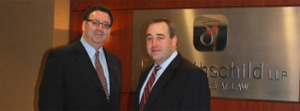Over on New Jersey Family Legal Blog, I saw a post that editor Eric Solotoff, a family law attorney at Fox Rothschild wrote that struck my interest.
Upon reading the post, Madoff Mess Hits Divorce Court, I knew I had to sit down with Eric for a podcast, to discuss what all this means in respect to forensic accounting.

For context, Justice Saralee Evans in Manhattan recently decided on a case regarding a divorcing spouse who attempted to revise his agreement with his wife.
First, some background for our readers who may not be that familiar with the case:
After thirty years of marriage, a husband and his ex-wife spent nearly two years debating the value of their home in Scarsdale, The husband’s law partnership, and their Manhattan apartment. The two agreed on at least one thing: an account they opened during their marriage with Bernard Madoff Investment Securities LLC was worth $5.4 million.
As part of a 2006 equitable distribution agreement, the husband claimed he paid his wife some $2.7 million, which represented what he thought was his ex-wife’s fair share of their investments with Madoff. But after Madoff’s arrest in December 2008, the husband attempted to redo the agreement, claiming it was based on a “material, mutual mistake” and resulted in a windfall for his ex-wife.
After the husband learned that he and his wife had “been tricked by a sophisticated fraudster,” he sought to reform the divorce agreement. The husband claimed the agreement did not accomplish the parties’ goal of ensuring that each would keep approximately half of the marital assets.
The husband alleged that because the Madoff account turned out to be valueless, the spirit of the agreement was broken. But according to Justice Evans, there was no evidence that defendant was unjustly enriched.
Justice Evans last December held that while the husband’s decision to hold on to the Madoff account may have been “improvident,” that did not give the Court an equitable basis to set the agreement aside. In dismissing the suit, Justice Evans wrote, “There is no evidence that defendant was unjustly enriched. In 2006, at the time of their agreement, each of the parties received the benefit of his or her bargain.”
Justice Evans rejected the husband’s argument that the mutual releases of both parties signed as part of their divorce agreement were based on a mutual mistake. The husband had liquidated part of his Madoff investment to fund his wife’s equitable entitlement. So in 2006, and several years after, that the husband maintained this investment, the account could have been redeemed for cash, presumably in excess of its 2004 value. The wife’s attorneys said Justice Evans’ ruling underscored the importance of ensuring that both sides in a divorce agreement waive future claims against each other.
The lesson of this case is that clients and their divorce attorneys should be very careful in fashioning settlement agreements. Even when significant mistakes are made at the time the agreements are entered into, it’s very difficult to set them aside–even in such extreme circumstances as being a victim of a historic scam.
To learn more about this decision please listen to our podcast with Eric.

